24 Hours Hotline: +8613735411378
Email:chengdu@tripstoshanghai.com
24 Hours Hotline: +8613735411378
Email:chengdu@tripstoshanghai.com
China is the birthplace of the iconic giant panda, and there's no better place to experience these adorable creatures than in the stunning landscapes of Sichuan Province. Known as the "Panda Capital," Chengdu is the ultimate destination for panda lovers, offering unrivaled opportunities to see these majestic animals. As the heart of panda conservation, Chengdu is home to some of the world's most renowned panda reserves. But it's not just Chengdu—other cities across China, such as Dujiangyan, Ya'an, and even some in Shaanxi, also boast famous panda bases that welcome visitors eager to witness these beloved creatures in their natural habitat. Whether you’re in Chengdu or exploring other parts of China, the chance to see a panda in real life is an experience you won't want to miss!
Overview
China is home to the giant panda, one of the world’s most cherished and endangered animals. While pandas are found in several parts of the country, Sichuan Province stands out as the ultimate panda haven, with Chengdu at its heart. Known as the "Panda Capital," Chengdu offers an array of experiences for those eager to observe pandas in their natural habitat or visit conservation centers dedicated to their protection. Beyond Chengdu, other cities such as Dujiangyan and Ya'an also house well-established panda reserves, making China a must-visit destination for any panda lover. Whether you're watching them play in a lush reserve or learning about ongoing conservation efforts, a panda encounter in China is a once-in-a-lifetime experience that combines wildlife, culture, and nature.
Panda name origin & Background
The name "panda" is believed to come from the Nepali word "poya," which refers to the bamboo-eating bear. Historically, pandas were known by different names in various Chinese dialects, but it was the term "dà xióngmao", meaning "giant bear cat," that eventually became the widely recognized term. This name reflects their physical characteristics—large, bear-like bodies and cat-like agility. The giant panda (Ailuropoda melanoleuca) is native to China and can be traced back to ancient times, with fossil evidence suggesting that pandas have roamed the earth for millions of years. Today, pandas are a symbol of conservation, and their survival depends heavily on China’s extensive preservation efforts, making them a national treasure and a symbol of wildlife protection.
Home of the giant panda
The Giant Panda, a Chinese national treasure, is one of the rarest animals in the world. The total number is estimated to be 1,500, including those living in the wild, 80 percent of which are in Sichuan Province. A breeding center for giant pandas called Chengdu Research Base of Giant Panda Breeding was founded in the north suburbs of Chengdu. It is the only one of its kind in the world that's located in a metropolitan area. In order to better protect wild giant pandas, Chengdu has established nature reserves in Dujiangyan City, Chongzhou City, and Dayi County. Sichuan Wolong Giant Panda Nature Reserve, the biggest of its kind in the world, is only 130 km (81 mi) outside Chengdu. After the Wenchuan earthquake, most of it was moved to Ya'an.
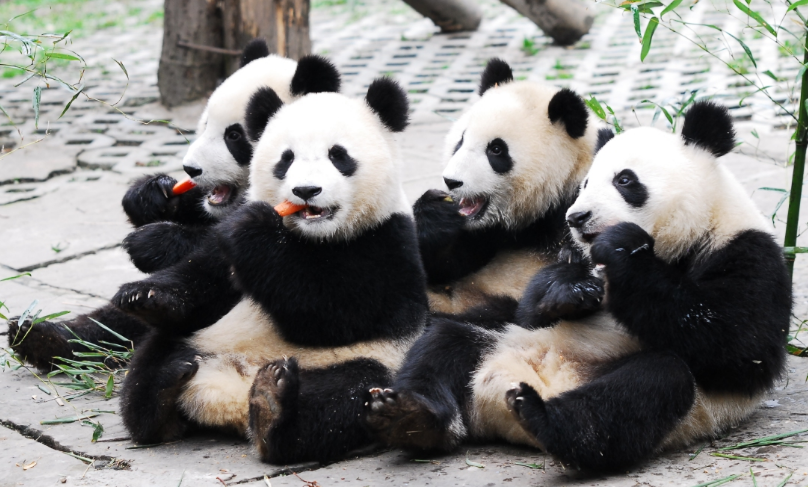

The western world came to know giant pandas only after a French missionary named David first encountered this species in Sichuan in 1869. Now, the somewhat clumsy giant panda is a symbol representing the World Wildlife Fund. They are also a messenger of friendly communication between Chengdu and international cities. Currently, giant pandas are also reared in U.S.A, Germany, Austria, Belgium, Canada, Japan, Thailand as well as Mexico.
In 2008, after the release of the American animation movie Kung Fu Panda, DreamWorks CEO Jeffrey Katzenberg and other DreamWorks members visited the city of Chengdu. In addition to seeing live pandas, crew members learned about the local culture. Katzenberg has stated that Kung Fu Panda 2 incorporates many elements of Chengdu in the film. The film's landscape and architecture also found inspiration from those found at Mount Qingcheng, a renowned Taoist mountain. In an interview with Movieline, Berger stated that ‘we never really thought of this as a movie set in China for Americans; it's a movie set in a mythical, universalized China for everyone in the world'.
On 11 January 2012, six captive-bred pandas were released to a "semi-wild" environment in Dujiangyan, Chengdu. Scientists believe that success in the reintroduction project would potentially help save the endangered giant panda. Retired NBA basketball star and animal activist Yao Ming attended the ceremony.

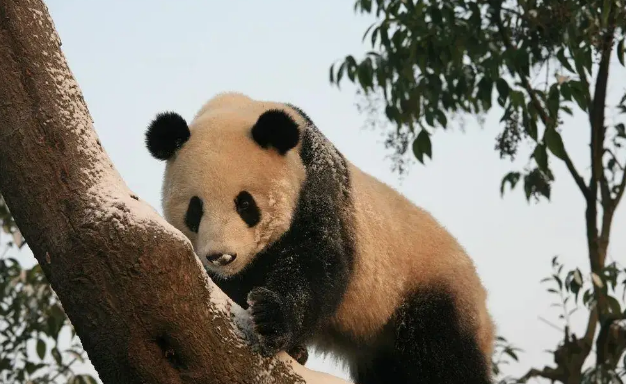
Where to See Panda Bears in China
A. Sichuan Province: Core Area for Giant Panda Conservation
1. Chengdu Research Base of Giant Panda Breeding
A world-renowned panda breeding center dedicated to the conservation of giant pandas. The base offers the opportunity to see pandas at various stages of their life.
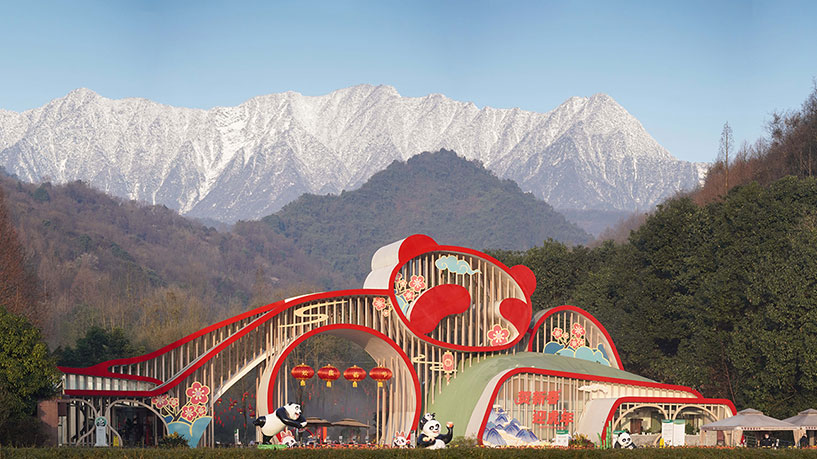
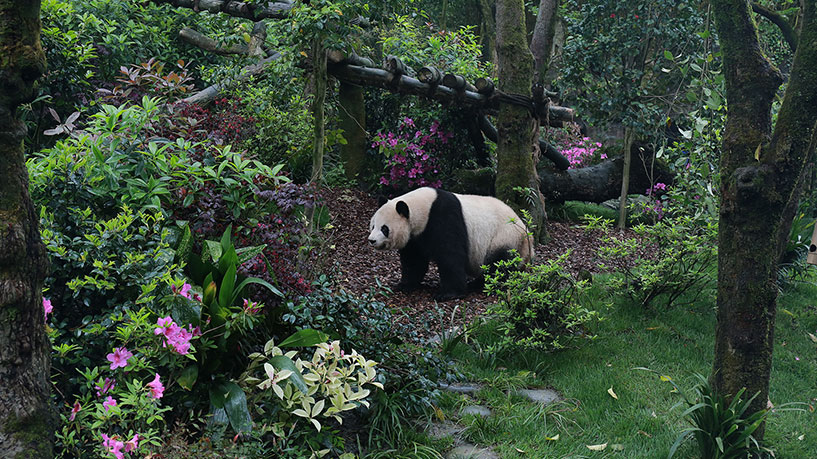
Address: No. 1375, North Panda Avenue, Chenghua District, Chengdu, Sichuan, China
Phone: +86-28-83510033
Opening hours:
· From November to February: Morning admission at 8:00-12:00; Afternoon admission at 12:00 AM - 04:30 PM (closed at 05:30 PM)
· From March to October: Morning admission at 07:30 AM - 12:00 PM; Afternoon admission at 12:00 PM - 05:00 PM (closed at 06:00 PM)
Highlights:
· See panda cubs and adults in a naturalistic setting.
· Participate in panda volunteer programs (e.g., feeding, cleaning enclosures).
· Educational exhibitions on panda conservation.
Transportation:
· “Metro + Bus” Route:
Take Metro Line 3 to Chengdu Junqu General Hospital Station and exit at Exit B. Then Walk 280 meters to the bus stop. Transfer to Shuttle Bus 409 to reach the West Gate (about 10-min drive). Or transfer to Bus 110/659 to reach the West Gate.
Another way is take Metro Line 3 to Panda Avenue Station and exit at Exit A. Then Transfer to Shuttle Bus 408 to reach the South Gate. Take Metro Line 3 to Zoo Station and exit. Or Transfer to Bus 655/87 to reach the South Gate.
· Scenic Area Direct Bus (Direct Bus): Direct route to popular scenic areas in the downtown area: There are dedicated buses to attractions like Chunxi Road, and Kuanzhai Alleys.
Inquiry Method: Follow the public platforms.
WeChat Mini Program: Scenic Area Direct Bus|Chengdu Bus APP
Public Account: Chengdu Tourism & Sightseeing Bus
Website: https://www.panda.org.cn/en/
2. Ya’an Bifengxia Base
Situated in the mountains of Ya'an, this panda base offers a more serene experience surrounded by nature.
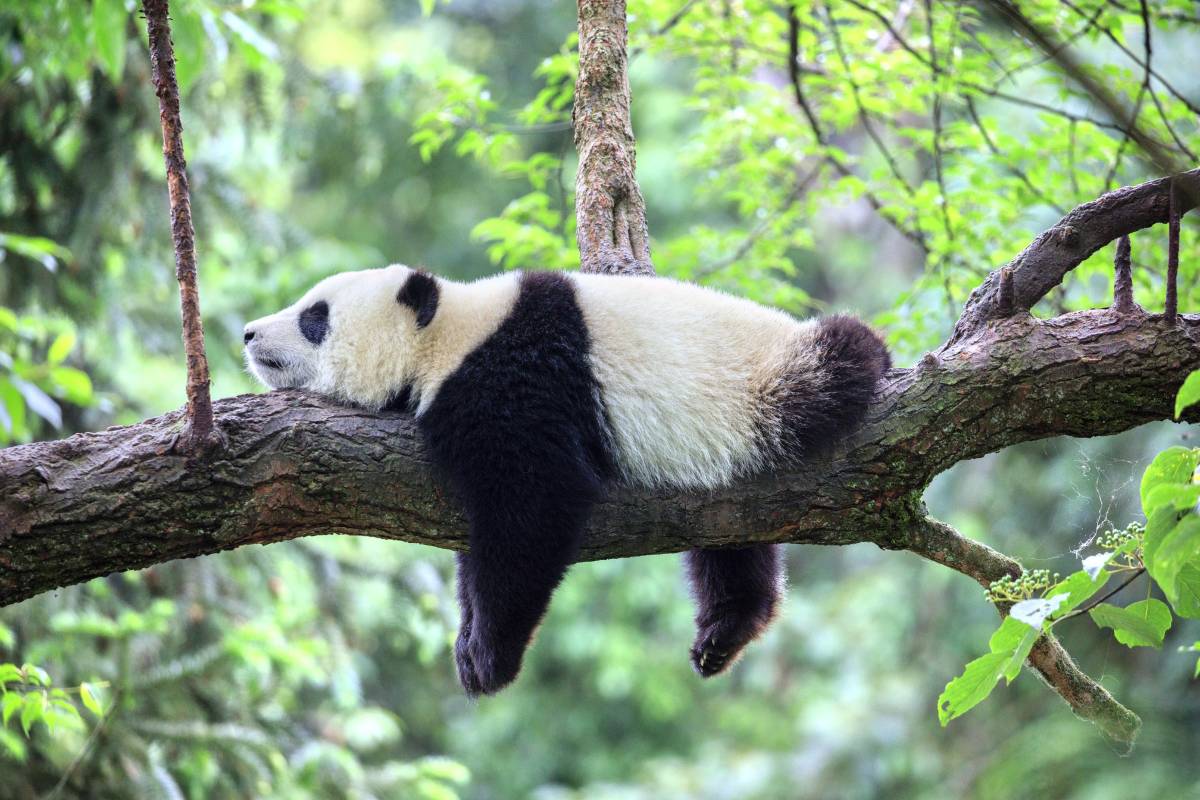
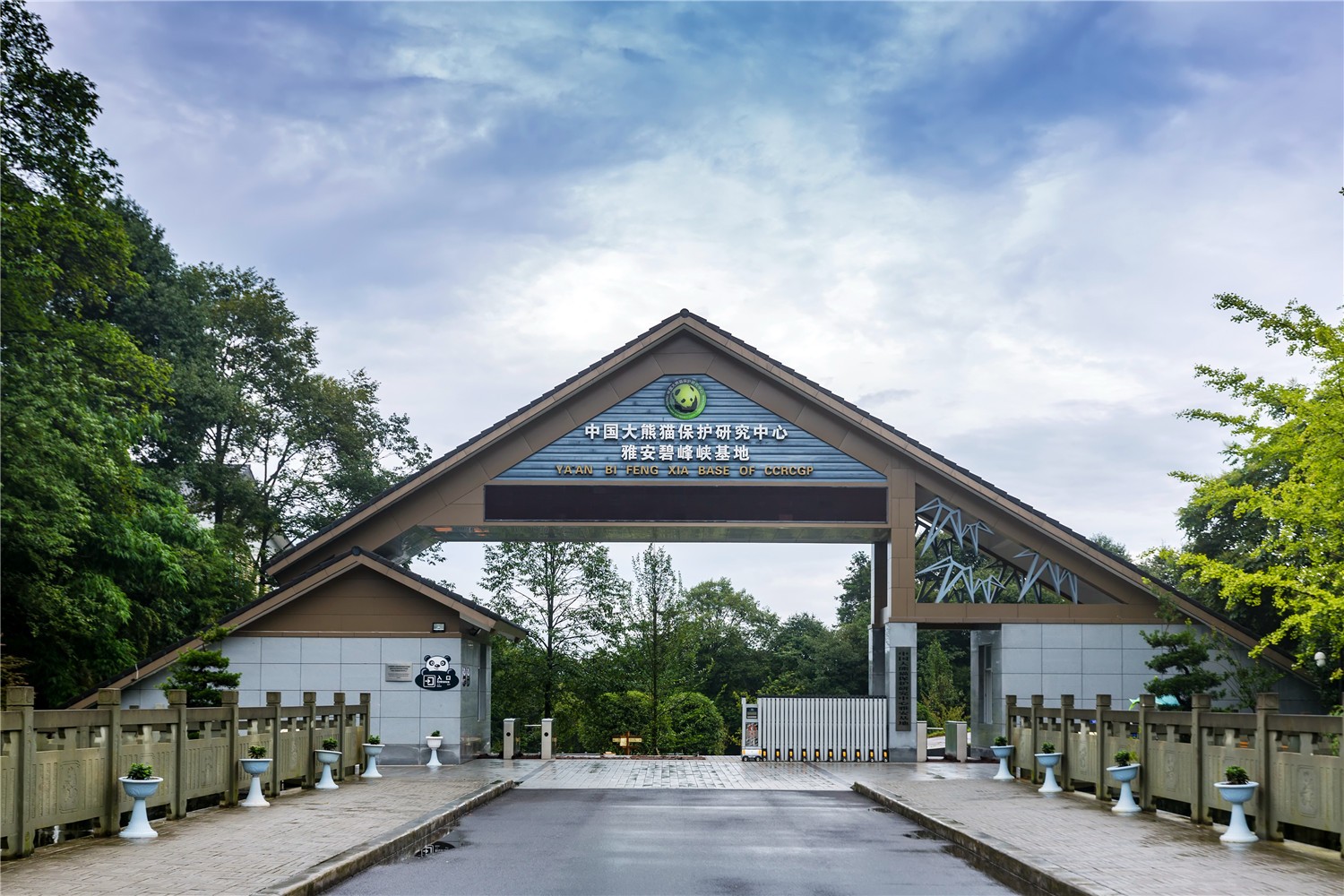
Address: Bifeng Gorges Scenic Resort, Yucheng District, Ya'an, Sichuan, China
Phone: +86-835-2318091
Opening hours: 09:00 AM - 04:00 PM
Highlights:
· Unique opportunity to see pandas in a less touristy setting.
· Scenic surroundings with trekking trails.
· Visitors can also participate in the “Panda Keeper” program.
Transportation:
· Buses:
Passenger Bus Stations in Chengdu: You can take a long-distance passenger bus to Bifengxia from the following stations: Xinnanmen Bus Station or Shiyangchang Bus Station
Ticket price: Approximately 46 yuan.
· Car: You can take the Chengdu-Ya'an Expressway (Chengya Expressway), which has a toll fee of approximately 51 yuan. Alternatively, you can take the Chengdu-Wenjiang-Qionglai Expressway (Chengwenqiong Expressway), with a toll fee of approximately 37 yuan for vehicles registered in Chengdu and about 57 yuan for vehicles from other regions. It is recommended to exit at the Ya'an North Exit, then turn left onto Yabi Road towards Bifengxia Scenic Area. The distance is about 12 kilometers, and the drive will take approximately 20 minutes.
· From Ya'an to Bifengxia Scenic Area: At Ya'an North Second Road (formerly the Tourist Bus Station), take a special yellow minibus to Bifengxia Scenic Area. The ticket price is 6 yuan.
· Train: High-speed trains depart from Chengdu West Station, Chengdu South Station, and Chengdu East Station to Ya'an, with about 43 train departures daily.
· Returning to Chengdu from Bifengxia: Take a dedicated Bifengxia to Ya'an shuttle bus to North Second Road. From there, you can catch buses to either Xinnanmen Bus Station or Shiyangchang Bus Station in Chengdu. Buses depart every 30 minutes. Alternatively, you can also catch a bus at Ya'an Bus Station or Ya'an Train Station.
Distance from Chengdu: The Bifengxia Scenic Area is located 12 kilometers north of Ya'an and about 128 kilometers from Chengdu, with a driving time of approximately 90 minutes.
Website: http://www.bifengxia.com/
3. Wolong China Giant Panda Garden Shenshuping Base of CCRCGP
One of the earliest and most important conservation centers for pandas, located in the Sichuan province.
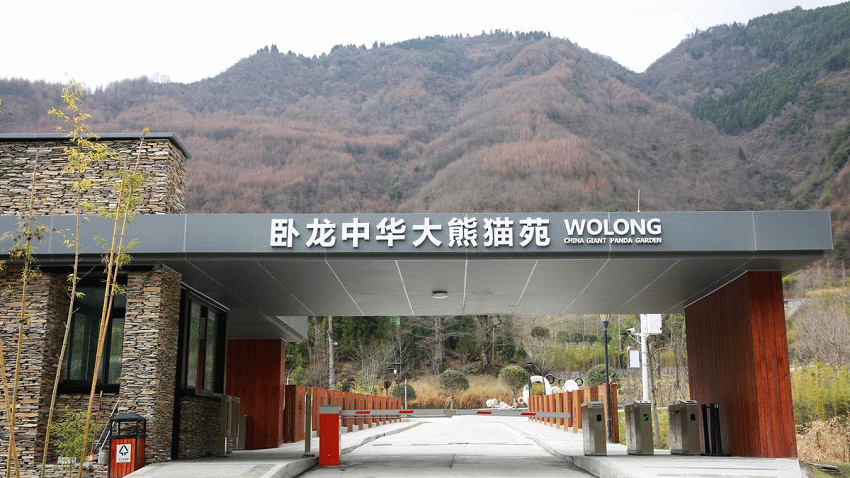
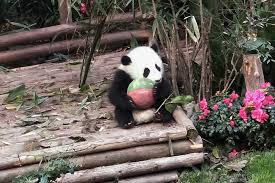
Address: 28 Xingfu Avenue, Gengda Town, Wolong Special District, Aba Prefecture., Sichuan, China
Phone: +86-837-6984864
Opening hours: 09:00 AM – 05:00 PM (Admission ends at: 04:30 PM; Tickets available until: 04: 30 PM)
Highlights:
· Scenic nature reserve with a rich ecosystem.
· Learn about panda research and protection efforts.
· Panda rescue center for sick or injured pandas.
Transportation:
· Buses: From Chengdu Chadianzi Bus Station, you can take a bus to Dujiangyan Bus Station. There is a bus from Dujiangyan Bus Station to Gengda that departs at 3:00 PM every day. The bus ride takes about one hour. After getting off, walk uphill for about 20 minutes towards the direction of the sign to reach the destination.
· Car: The driving route from Chengdu to Gengda Township takes about 2 hours and covers a distance of approximately 105 kilometers. Start by driving on the Chengguan Expressway towards Dujiangyan, then continue on the Duwen Expressway to Yingxiu Town. From there, take Provincial Road 303 to Gengda Township. Alternatively, you can search for the "China Giant Panda Protection and Research Center Gengda Shenshuping Base" in your navigation system for easier guidance.
Distance from Chengdu: The Wolong Nature Reserve is located in Wenchuan County, Aba Prefecture, approximately 120 kilometers from Chengdu and more than 50 kilometers from Dujiangyan.
Website: http://www.wolongpanda.vip/
4. Dujiangyan Panda Base (formerly known as Panda Paradise)
China's Giant Panda Conservation Research Center, Dujiangyan Base (also known as Panda Paradise) is located in Daguan Town, Dujiangyan City. At the base there are numerous charming, silly pandas along with sprawling lawns and bamboo forests, full of fresh air. This is a great place to have fun and see cute giant pandas, but also a great please to grow in knowledge and broaden your horizons.
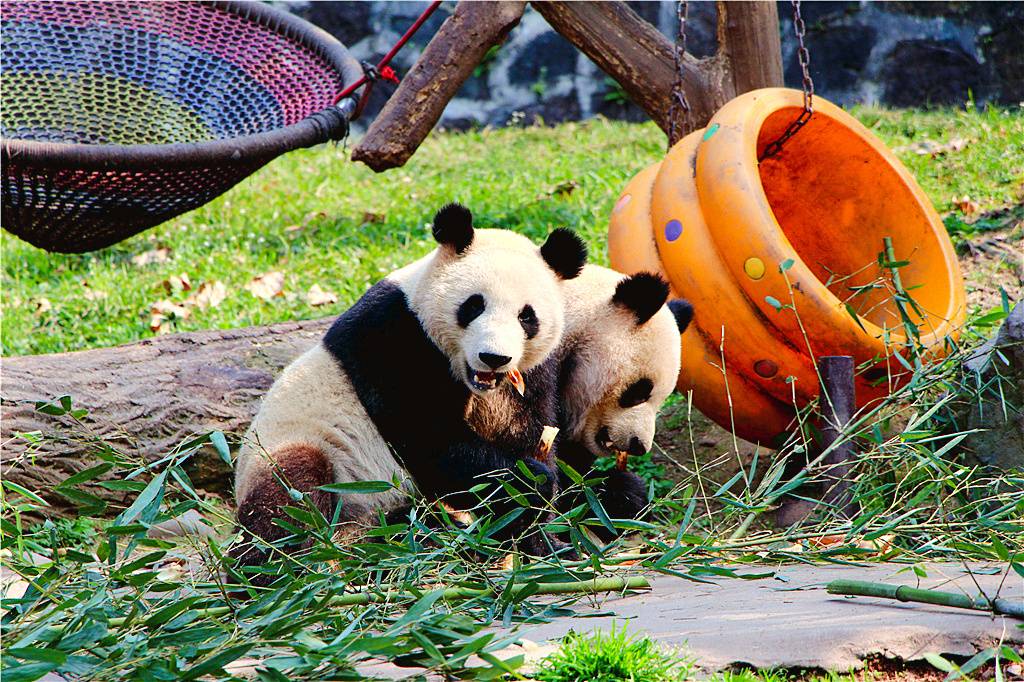
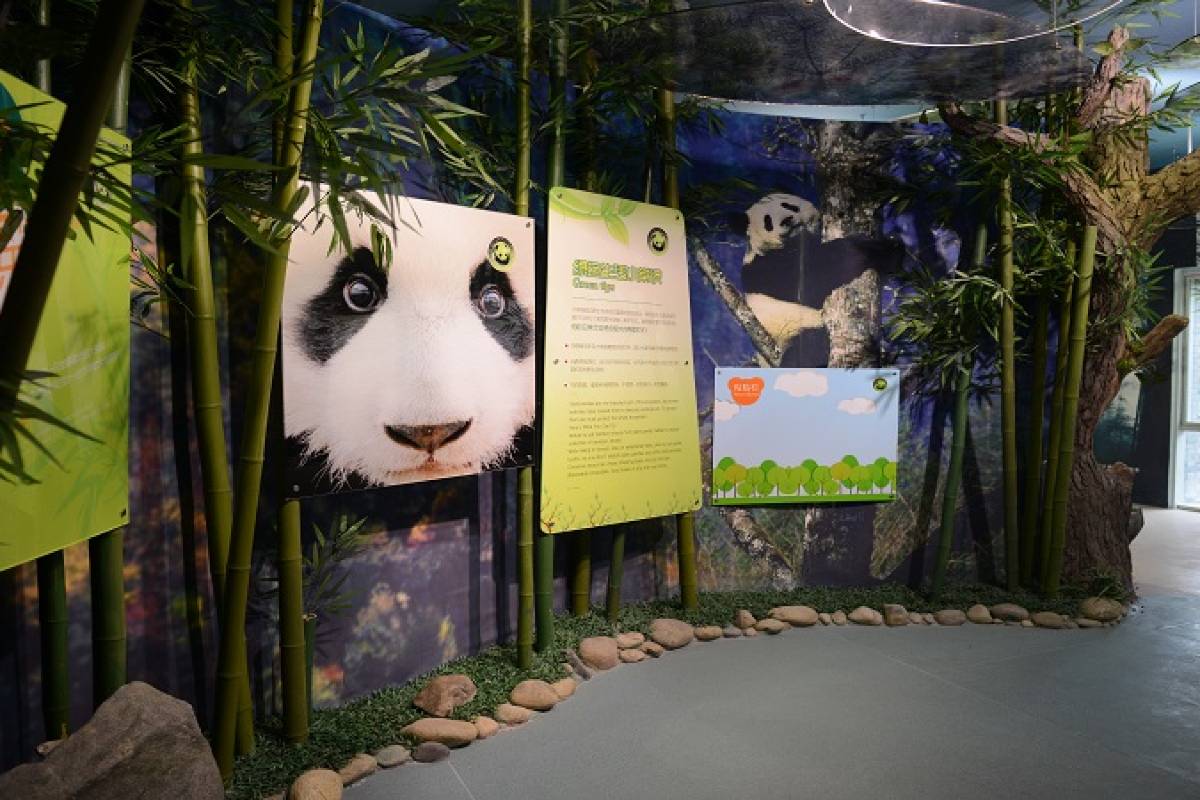
Address: Guanyinyuan, Dujiangyan City, Chengdu (between Qingchengshan Town and Daguan Town, Huaizhong Road), Sichuan, China
Phone: +86-19136072640
Opening hours: 08:30 AM – 05:00 PM(Admission ends at:04:30 PM)
Highlights:
· Nestled in a picturesque mountainous area with lush forests and a tranquil environment perfect for pandas.
· Educational programs and interactive exhibits on panda research, conservation efforts, and the importance of biodiversity.
· Close encounters with pandas in a naturalistic setting, with opportunities to see pandas of various ages, from cubs to adults.
· Panda volunteer program available for visitors wanting to help with feeding and cleaning panda enclosures (advance booking required).
Transportation:
· Buses: Starting from Chengdu Chadianzi Bus Station, take a bus to Dujiangyan Bus Station. From there, take Bus 102 (towards Jiezi Ancient Town) and get off at the Panda Paradise Station.
· Car: Drive on the Chengguan Expressway, then take the road to Chongyi and Huai Zhong Road to Panda Paradise. Alternatively, you can search for "China Giant Panda Protection and Research Center Dujiangyan Base" on your navigation system.
· High-Speed Train: Starting from Chengdu North Railway Station, take the high-speed train to Qingchengshan Railway Station. From there, take Bus 102 (towards Jiezi Ancient Town) and get off at the Panda Paradise Station.
Distance from Chengdu: It is located 18 kilometers from the city center, with the Taoist sacred site Qingcheng Mountain to the north and the ancient town of Jiezi to the south. Provincial Road S106 (the Western Sichuan Tourism Loop) connects these areas.
5. Mianyang Panda Base (Newly Opened in 2025)
Situated in Gulou Mountain Ecological Park, Mianyang Science and Technology City New Area, the Mianyang Panda Base is the latest facility under the China Conservation and Research Center for the Giant Panda (CCRCGP), entering trial operation in November 2025. Covering an area of 120 hectares, it features 54 panda enclosures and a dedicated Disease Control and Rescue Area. Positioned as a comprehensive conservation base in the northern section of Giant Panda National Park, it plays a key role in supporting the protection of giant panda populations in the Minshan Area and advancing related scientific research and technological development.
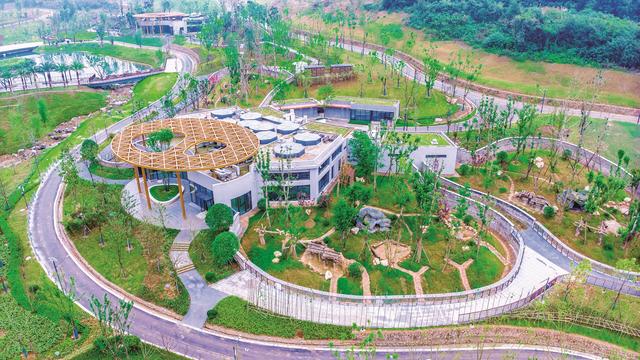
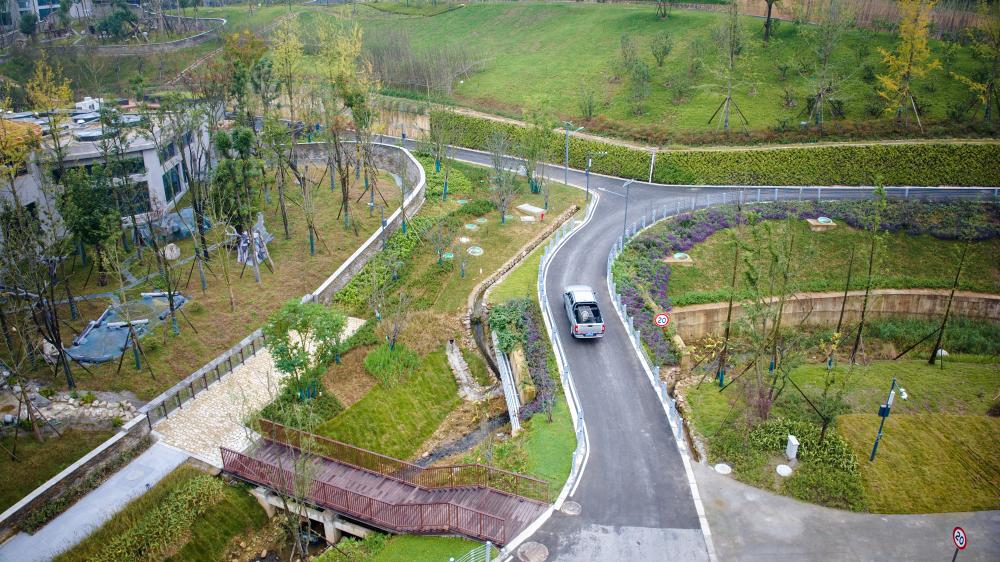
Address: Gulou Mountain Ecological Park, Science and Technology City New Area, Mianyang, Sichuan, China
Opening hours: The base is currently closed to the general public as the pandas undergo a critical adaptation period under professional observation and care. The base will gradually open to the public in 2026 after the adaptation period concludes. According to official sources, the tentative full opening is scheduled for January 2026 . However, specific dates and ticketing details will be announced via the China Conservation and Research Center for the Giant Panda (CCRCGP) official channels.
Highlights:
· Officially launched trial operation in November 2025, serving as the newest flagship base of CCRCGP with large-scale and advanced facilities.
· Spans 120 hectares of ecological land, equipped with 54 well-designed enclosures and a professional Disease Control and Rescue Area to meet multi-age panda care needs.
· Functions as a core support for Minshan Area panda conservation, integrating population management, scientific research, and technological innovation.
· Houses an initial group of 13 giant pandas (including cubs, sub-adults, and elderly individuals), with plans to gradually open to the public in phases.
Transportation:
· “High-Speed Train + Bus” Route: Take a high-speed train from Chengdu East Railway Station to Mianyang Station (30–40 minutes, frequent departures daily). From Mianyang Station, transfer to a dedicated shuttle bus (No. 901) to "Gulou Mountain Ecological Park Station" (30 minutes, operates every 40 minutes from 08:00 AM to 05:00 PM). Alternatively, take a taxi from Mianyang Station directly to the base (about 25 minutes, fare around 30–40 RMB).
· Car: Take the Chengdu-Mianyang Expressway (G5 Beijing-Kunming Expressway) eastward, exit at "Mianyang Science and Technology City New Area" toll gate, then follow the directional signs to "Gulou Mountain Ecological Park" for about 10 minutes.
Distance from Chengdu: Approximately 120 km, with a travel time of 1.5–2 hours.
The five major bases of the Panda Center complement each other in their functions:
· Wolong Shenshuping and Hetaoping focus on breeding and rewilding,
· Dujiangyan specializes in disease prevention and rescue,
· Bifengxia in Ya'an is responsible for international exchanges and public education,
· The Mianyang base strengthens regional conservation and the integration of technology.
Through this strategic layout, the Panda Center has established a comprehensive life-cycle conservation network, covering everything from "breeding - rewilding - release - monitoring" to "disease prevention - public education," providing a "Chinese solution" for global biodiversity conservation.
2. Other provinces: Regional protection and display
1. Foping Rescue and Breeding Base (Hanzhong, Shaanxi)
Located in Shawo Village, Changjiaoba Town, Foping County, the Foping Rescue and Breeding Base is a core facility dedicated to the conservation of Qinling giant pandas. As a professional institution focusing on rescue, treatment, and artificial breeding of Qinling giant pandas, it plays a vital role in protecting the unique subspecies of giant pandas in the Qinling Mountains. Currently housing 4 giant pandas, the base integrates scientific research with ecological protection, while collaborating with nearby scenic spots to promote eco-tourism.
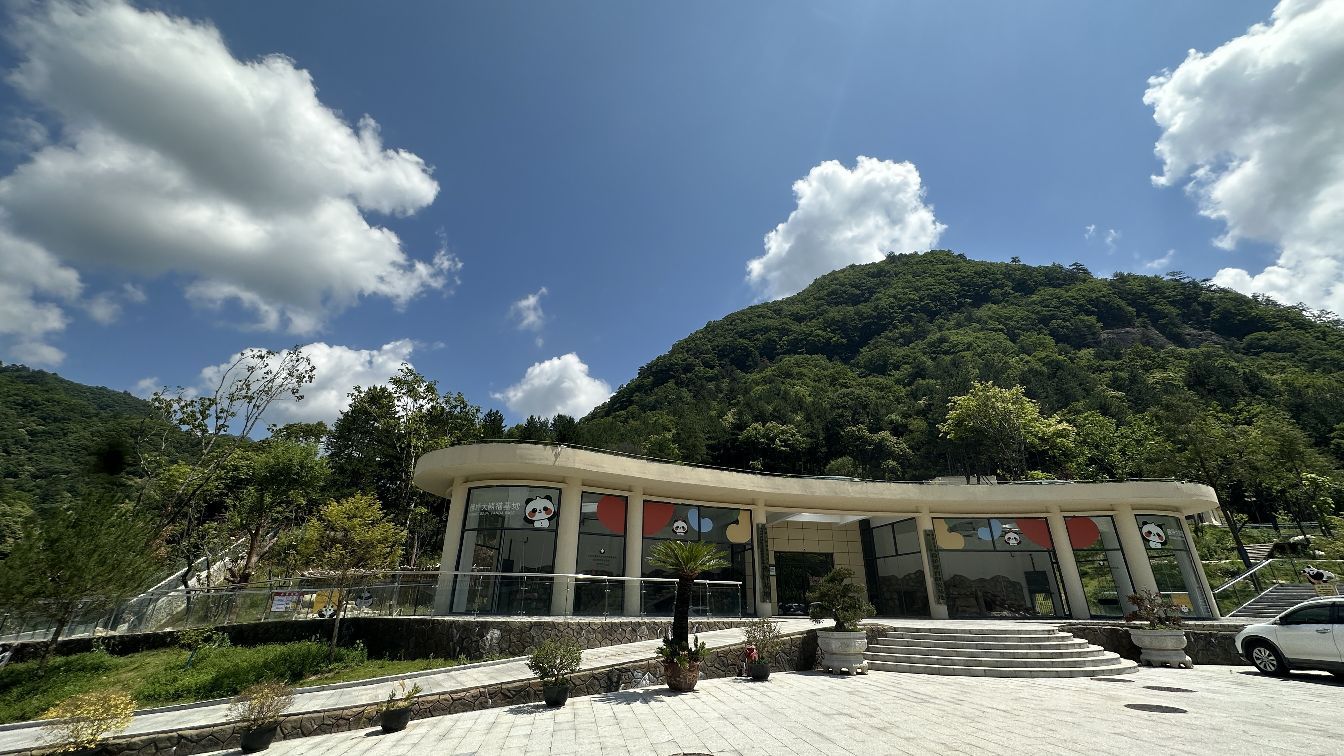
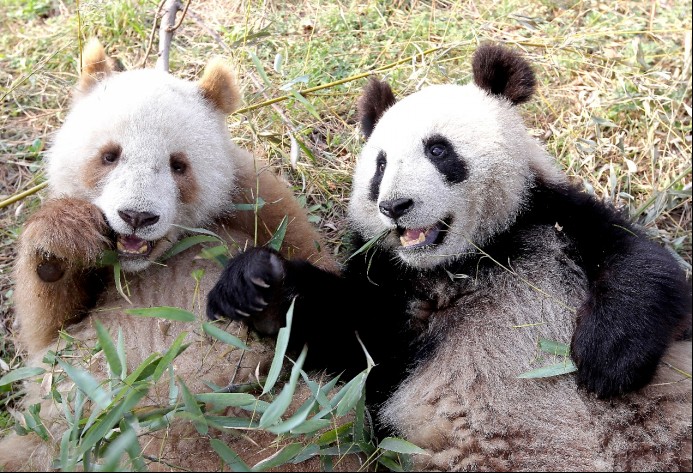
Address: 60 meters east of Yaoguang Pool, Sha Wo Village, Changjiao Ba Town, Foping County, Hanzhong, Shaanxi, China
Opening hours: 09:00 AM – 04:30 PM (last entry at 04:00 PM), closed on Mondays (except public holidays).
Highlights:
· Specializes in rescuing injured, sick, or abandoned wild Qinling giant pandas, providing professional medical treatment and rehabilitation training.
· Undertakes artificial breeding programs to maintain the genetic diversity of the Qinling giant panda population.
· Houses a small but precious group of 4 giant pandas, allowing visitors to observe the unique characteristics of Qinling pandas (e.g., smaller size and rounder faces).
· Forms a seamless eco-tourism network with Foping Panda Valley and Taibai Mountain National Forest Park, offering in-depth nature exploration experiences.
· The Qinling giant pandas are known for their unique coat color, referred to as the Qinling color pattern. This rare characteristic has only been observed in the Qinling Mountain region, where a total of 10 brown giant pandas have been recorded throughout the country.
Transportation:
· From Xi’an: Take a high-speed train from Xi’an North Railway Station to Foping Station (2.5–3 hours), then transfer to a county bus or taxi to the base (30 minutes, fare around 20–30 RMB).
· From Hanzhong: Drive via the Hanzhong-Foping Expressway (1.5–2 hours) or take a long-distance bus from Hanzhong Bus Station to Foping County (2.5 hours), followed by local transportation to the base.
· Car: Navigate to "Foping Giant Panda Rescue and Breeding Base" directly, with well-maintained mountain roads and parking facilities available.
2. Chongqing Zoo
Located at No. 1 Xijiao Village, Yangjiaping, Jiulongpo District, Chongqing Zoo is one of China’s oldest and most renowned zoos, renowned for its large giant panda population. Home to 23 giant pandas, it ranks among the zoos with the highest number of captive pandas in China. The Panda House, built in the 1960s, has been renovated and upgraded over the years to provide a comfortable habitat for pandas while offering visitors excellent viewing opportunities.
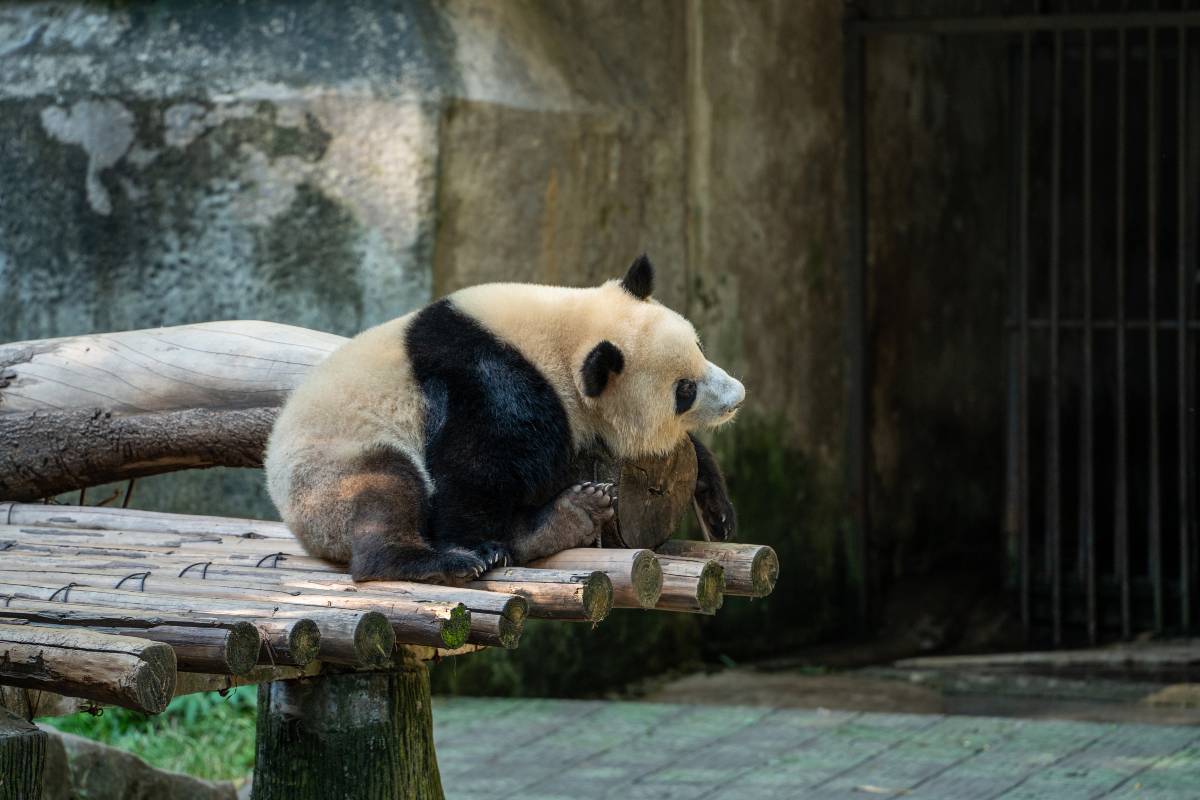
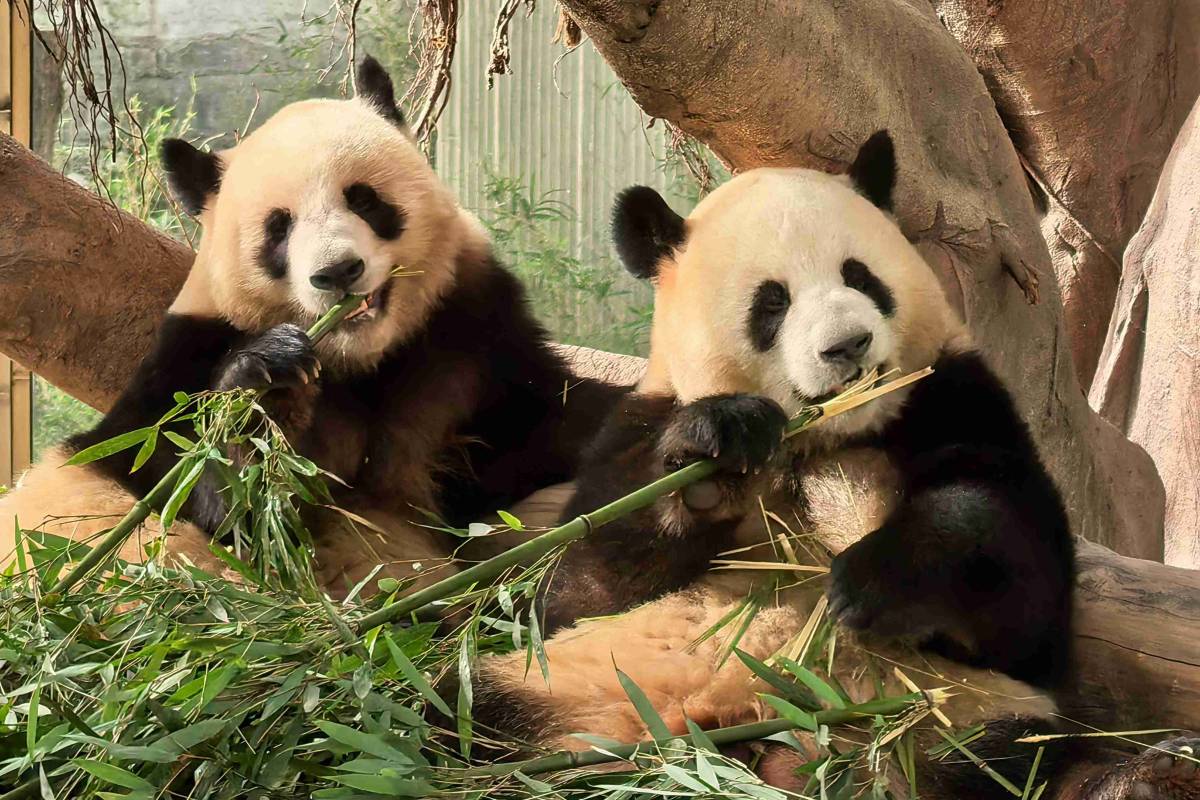
Address: No. 1 West Village, Jiulongpo District (near Xijiao Branch Road), Chongqing, China
Phone: +86-23-63817001
Opening hours:
· May 1–Sep 30 every year: 07:30 AM – 04:30 PM
· Every year from Oct 1 to Apr 30 of the following year: 08:00 AM – 04:30 PM
Highlights:
· Boasts a stable population of 23 giant pandas, including cubs, adults, and elderly individuals, making it a top destination for panda enthusiasts in southwest China.
· The historic Panda House, with a history of over 60 years, features spacious enclosures, naturalistic landscapes, and transparent viewing windows for up-close observation.
· Pandas are most active during feeding times (9:00 AM and 3:00 PM), when visitors can witness their feeding, playing, and climbing behaviors.
· Combines panda viewing with other wildlife exhibits (e.g., tigers, elephants, monkeys) and lush greenery, suitable for family outings and leisure visits.
Transportation:
· Metro:
Route 1: Take Metro Line 2 then exit at Zoo Station, Exit 1, then walk along Xijiao Road to reach the East Gate 2 of Chongqing Zoo.
Route 2: Take Metro Line 2 then exit at Yangjiaping Station, Exit 1, then walk along Xijiao Road and Xijiao Branch Road to reach the East Gate 1 of Chongqing Zoo.
· Buses:
Route 1: Take bus 1200, 1265, 148, 204, 207, 229, 275, 310, 341, 362, 413, 416, 419, 420, 426, 428, 454, 471, 475, 478, 822, or the Xipeng-Maoxianggou Special Line to the Zoo Station, then walk along Xijiao Road to reach East Gate 2 of Chongqing Zoo.
Route 2: Take bus 1265, 148, 204, 207, 229, 265, 275, 298, 310, 341, 362, 413, 416, 419, 420, 426, 428, 454, 471, 475, 478, 481, 822, or the Xipeng-Maoxianggou Special Line to Yangjiaping Xijiao Station, then walk along Xijiao Branch Road to reach East Gate 1 of Chongqing Zoo.
Website: http://www.cqzoo.com/cqzoo/index.html?_t=1762500763460
3. Guangzhou Chimelong Safari Park
Situated in Panyu District, Guangzhou, Chimelong Safari Park is the largest ex situ conservation base for giant pandas in South China. Unlike traditional zoos, it integrates panda conservation with a safari-style environment, allowing pandas to live in large, naturalistic habitats that mimic their wild homes. The park showcases the harmonious coexistence between giant pandas and other wildlife, making it a unique ecological tourism destination in the Pearl River Delta.
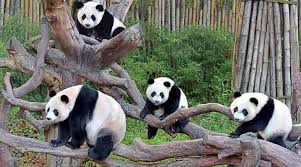
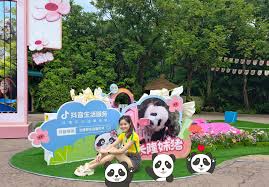
Address: No. 1 West Village, Jiulongpo District (near Xijiao Branch Road), Chongqing, China
Phone: +86-23-63817001
Opening hours: 09:30 AM - 06:00 PM
Highlights:
· Serves as the largest ex situ conservation center for giant pandas in South China, housing a healthy and growing panda population.
· Panda enclosures are designed as semi-wild habitats with dense forests, bamboo groves, and natural water bodies, replicating the pandas’ native ecological environment.
· Integrates panda viewing with safari experiences (e.g., driving through African savanna areas, walking through primate zones), offering a comprehensive wildlife experience.
· Features interactive popular science exhibits and educational activities, such as panda conservation lectures and bamboo-planting workshops, suitable for students and families.
Transportation: For more details, please visit the official website.
Website: https://www.chimelong.com/gz/safaripark/
Comparison of four giant panda viewing hot spots
| Items | Chengdu Research Base of Giant Panda Breeding | Ya’an Bifengxia Base | Dujiangyan Panda Base | Wolong Panda Base |
| Location | Urban area of Chengdu, with the most convenient transportation | Suburban area of Ya'an, about 2.5~3 hours from the urban area | Dujiangyan, about 1.5 hours from the urban area | Wolong, Wenchuan County, about 2.5~3 hours from Chengdu urban area, mountainous environment |
| Number of Pandas | Plenty, covering everything from cubs to adults | Plenty, scattered in multiple parks | Relatively few, mainly adult and elderly pandas | Plenty, including a mix of cubs and adults |
| Celebrity Pandas | Huahua, Yuanmeng, Little Prince (returnee from France) | No specific celebrity pandas, but large in number | Meilan, Oreo, Zhenxiong | Famous pandas like Fubao, Xiaoqiji, and more |
| Crowds | Crowded on holidays, requiring queuing | Relatively few tourists | Few people, quiet and secluded | Fewer crowds, Moderate, fewer than Chengdu Base, comfortable visiting experience |
| Shooting Distance | About 5-15 meters | Depends on different panda areas | Some can be shot at close range | Moderate to close, depending on panda activity areas |
| Environmental Atmosphere | Urban-type zoo | Large ecological park integrated with canyon scenery | Natural valley park | Natural mountain habitat, simulating pandas’ original living environment |
| Additional Activities | Panda Museum, Pedestrian Street | Bifengxia Canyon, Zoo | Qingcheng Mountain, Dujiangyan Scenic Area | Visit panda research facilities, hiking, Wolong Nature Reserve exploration |
| Target Audience | First-time visitors to Chengdu with limited time | Ecotourists, in-depth travelers | Those who enjoy tranquility and photography enthusiasts | Panda conservation enthusiasts, scientific research interested visitors, in-depth travelers |
| Recommended Stay Duration | Half a day ~ 1 day | 1 or 2 days | 1 day | 1~2 days |
Fun facts about giant pandas
1. Giant pandas are not cats
Giant pandas belong to the order Carnivora, the bear family, the subfamily Ailuropodinae, and the genus Ailuropoda, making them the only species in this genus.
2. Nearsighted
Giant pandas have an excellent sense of smell and hearing, but their vision is poor. They are essentially "nearsighted," with a vision correction equivalent to around 800 degrees.
3. The "Sixth Finger"
To help grip bamboo, giant pandas have evolved a "sixth finger," also known as a "pseudo-thumb."
4. Waddle walk
Giant pandas walk in a slow, "duck-footed" style with their feet turned inward. This movement helps conserve energy, which is necessary because bamboo is a low-energy food.
5. Poop experts
To get the nutrition they need, pandas eat quickly and eliminate waste just as fast. They can defecate up to 40 times a day!
6. Short mating season
Female giant pandas only go into estrus once a year, and their fertility window lasts just 2 to 3 days. This brief mating period is one reason for the panda’s low reproduction rate.
Panda Watching Tips & Insider Information
1. Best Time to Visit
Giant pandas live in dense bamboo forests at an altitude of 2,600 to 3,500 meters, where the annual temperature is below 20?. They prefer cold and are afraid of heat. When the weather is cool, giant pandas will be active in outdoor activity areas. When the outdoor temperature rises above 26?, they will return indoors to escape the heat and their activity levels will decrease. The best seasons to visit are spring, autumn and winter.
2. Volunteering Opportunities
Many panda bases offer volunteer programs, such as feeding and cleaning the panda enclosures. This is a once-in-a-lifetime chance to interact with pandas, though programs can book up months in advance. However, due to the giant panda being a first-class protected species and for safety reasons, official regulations now prohibit volunteers from having close physical contact with the pandas. Volunteers can still participate in meaningful activities, such as preparing food for the pandas and assisting with other tasks that help care for them.
3. Photography Tips
Pandas tend to move slowly and are often resting, making them great subjects for photography. Use a telephoto lens to capture close-up shots without disturbing them. Keep your distance and avoid flash photography to respect their space.
4. Sustainable Travel
Choose eco-friendly tours that support the conservation of pandas. Be mindful of the environment, respect wildlife guidelines, and avoid littering.
5.What to Wear
If visiting panda reserves in mountainous areas, wear comfortable hiking shoes and light, breathable clothing. Weather in the mountains can vary, so bring a light jacket just in case.
From majestic pandas and stunning natural reserves to rich cultural landmarks and scenic beauty, China is a paradise for panda enthusiasts. Whether you're visiting world-renowned conservation centers, trekking through lush forests, or learning about panda research, there’s no shortage of unforgettable experiences for wildlife lovers. Don’t miss the chance to witness these incredible creatures in their natural habitats—your ultimate panda adventure in China awaits!
Your Way Holiday’s Curated Unforgettable Panda Viewing Experiences in China
We design private and tailor-made Chengdu tours customized to your travel style at affordable local prices. You’ll enjoy the comfort of a private, spacious car and the company of a professional local guide with over 5 years of experience, dedicated exclusively to you or your group. From transportation and tickets to authentic dining experiences (we always recommend the dishes most loved by locals), everything will be arranged according to your preferences. Please take a look at some of our most popular Chengdu tours below:
Not exactly what you’re looking for? Don’t worry — all of our Chengdu tours can be fully customized based on your interests, schedule, and budget. We specialize in creating unique Chengdu experiences that go beyond the guidebook, giving you the chance to truly connect with the local culture and people. Our enthusiastic tour experts are always ready to provide detailed suggestions and will respond to your inquiry within 24 hours. Ready to explore Chengdu your way? Contact us today and let us design a Chengdu shopping experience that fits your style. Your Way Holiday looks forward to your message! We're ready to design an unforgettable Chengdu trip for you anytime.
Wechat: Chinaprivatetour
24 Hours Hotline:
+8613735411378
1 to 1 tailor-made service from our professional travel advisors for the most sophisticated
Constantly excellent reviews for attraction, hotel and service Competitive price
Local experts provide quality tours Best selected knowledgeable local guides Authentic local restaurants
7*24 hours available to create you a worry-free tour. No Hidden Fees and absolutely no pressure to buy. Secured







